
Joint pain, stiffness, inflammation, fatigue, weakness…we’re not just describing arthritis, but a unique type of arthritis called rheumatoid arthritis (RA).
If you’re among the 18 million people worldwide who have struggled with RA and want to find effective relief for your RA symptoms, Chinese herbal medicine could be the natural and holistic solution you’ve been waiting for.
Chinese herbs have been used to manage pain, inflammation, and imbalances similar to RA for thousands of years. Now, we’re sharing why herbal medicine is so effective and how you can choose the best Chinese herbs to manage your rheumatoid arthritis.
What is Rheumatoid Arthritis (RA)?
RA is a chronic autoimmune disorder characterized by the body’s immune system mistakenly attacking its own tissues, particularly the synovium. Synovium is a lining that envelops the membranes of the joints. The body’s constant attack on the synovium causes inflammation, which eventually leads to joint damage, pain, and even disability if left untreated.
Types of Rheumatoid Arthritis
Not all cases of rheumatoid Arthritis are the same. Here are the most common types of RA and how they present:
- Seropositive RA
Seropositive RA is the most common type of RA. This type of arthritis is characterized by the presence of antibodies called rheumatoid factor (RF) and anti-cyclic citrullinated peptide (anti-CCP) in the blood. These antibodies attack healthy joint tissue, causing inflammation and damage. Seropositive RA can affect any joint in the body, but it most commonly affects the hands, wrists, and feet.
- Seronegative RA
Seronegative RA is a type of RA that does not show the presence of RF or anti-CCP in the blood. This type of RA is less common than seropositive RA, and its symptoms are usually less severe. Seronegative RA can still cause joint inflammation and damage, but it may take longer for a diagnosis to be made because the blood tests used to diagnose RA may come back negative.
- Juvenile RA
Juvenile RA is a type of arthritis that affects children and adolescents under the age of 16. Juvenile RA can be seropositive or seronegative, and its symptoms are similar to those of adult-onset RA. Juvenile RA can cause joint stiffness, pain, and swelling, as well as eye inflammation and growth problems.
- Palindromic RA
Palindromic RA is a rare type of RA that causes sudden, recurring attacks of joint inflammation. These attacks can last for hours or days and usually affect one joint at a time. Unlike other types of RA, palindromic RA does not cause permanent joint damage. The cause of palindromic RA is not known, but it is thought to be related to genetic and environmental factors.
- Felty’s syndrome
Felty’s syndrome is a rare complication of RA that affects about 1% of people with RA. Felty’s syndrome is characterized by the presence of three conditions: RA, an enlarged spleen, and a low white blood cell count. Felty’s syndrome can cause joint pain, swelling, and stiffness, as well as infections due to the low white blood cell count.
- Still’s disease
Still’s disease is a rare type of arthritis that usually affects children and young adults. Still’s disease is characterized by high fevers, rash, joint pain, and joint swelling. Still’s disease can be seropositive or seronegative, and its symptoms can be severe.
What Causes Rheumatoid Arthritis?
Like most autoimmune diseases, the exact cause of RA remains unknown. But, it is believed to be linked to a combination of genetic, environmental, and lifestyle factors.
- Genetics
Some people have a genetic predisposition to developing autoimmune conditions, as specific genes can increase your susceptibility to them.
- Environmental triggers
Frequent infections or exposure to certain toxins (like cigarette smoke or silica) may also increase your risk of developing RA.
- Lifestyle
When it comes to lifestyle, research suggests that certain lifestyle factors can play a role in RA. Those who smoke, are obese, or have chronic high stress seem to be more likely to develop RA.
- Gut health
Your diet and digestion can have an impact, too. Emerging research suggests a link between the gut microbiome and rheumatoid arthritis. An imbalance in gut bacteria may influence changes in the immune system and lead to the development of the disease.
Symptoms of Rheumatoid Arthritis
RA’s symptoms can be diverse and debilitating. While these symptoms often affect joints in the hands, wrists, knees, and feet, RA isn’t solely confined to joints – it can also have systemic effects, too. Here are the most common symptoms people with rheumatoid arthritis experience:
- Persistent pain and discomfort in multiple joints, often affecting both sides of the body symmetrically.
- Swelling and inflammation of the joints
- Stiffness and reduced joint mobility that’s worse in the morning
- Joints that feel warm to the touch and appear red or inflamed
- Profound and chronic fatigue, unrelated to activity levels
- Muscle weakness and general tiredness
- Firm, painless nodules beneath the skin, often near affected joints
- Limited flexibility and reduced range of motion in the affected joints
- Systemic symptoms like fever, weight loss, and generalized malaise
The Western Approach: Conventional Treatments for Rheumatoid Arthritis
There is no cure for RA yet, but there are some common treatments available. Conventional treatments for Rheumatoid Arthritis (RA) are primarily aimed at managing the symptoms, reducing inflammation, and slowing down the progression of the disease.
Conventional Treatments for Rheumatoid Arthritis
- Nonsteroidal Anti-Inflammatory Drugs (NSAIDs)
NSAIDs, such as ibuprofen and naproxen, are commonly used to alleviate pain and reduce inflammation in RA. While they provide relief from symptoms, they do not slow down the disease’s progression.
- Disease-Modifying Antirheumatic Drugs (DMARDs)
DMARDs like methotrexate and hydroxychloroquine are considered the first-line treatment for RA. They work to slow down the autoimmune response, reduce inflammation, and preserve joint function.
- Biologic DMARDs
Biologic DMARDs, including drugs like etanercept and adalimumab, are a newer class of medications that target specific molecules involved in the inflammatory process. They are often used when traditional DMARDs are not effective.
- Corticosteroids
Corticosteroids, such as prednisone, are potent anti-inflammatory drugs used to provide rapid relief during RA flare-ups. They can be administered orally or through injections directly into affected joints.
- Physical Therapy
Physical therapy helps maintain joint function and mobility, as well as strengthen the muscles around the affected joints. This is often used in conjunction with medication.
- Surgery
In severe cases of RA, surgical interventions like joint replacement surgery may be necessary to repair or replace damaged joints.
While conventional treatments are beneficial, they can be costly and do have limitations. Unfortunately, many of these medications can have side effects, including gastrointestinal issues, increased risk of infections, and potential liver or kidney problems. Some people may not experience complete symptom relief with these conventional treatments alone.
The good news is that complementary and alternative treatments, such as Chinese herbal medicine, offer natural, affordable, and side-effect-free support to conventional approaches for managing RA.
The Eastern Approach: TCM Treatments for Rheumatoid Arthritis
In Traditional Chinese Medicine (TCM), rheumatoid arthritis is believed to be caused by an imbalance in the body’s energy (Qi) and blood circulation. In treating RA, TCM practitioners use a combination of Chinese herbs for rheumatoid arthritis, acupuncture, and dietary changes.
TCM for Rheumatoid Arthritis
Traditional Chinese Medicine (TCM) takes a holistic approach to treating rheumatoid arthritis. Rather than focus on the symptoms alone, Chinese medical practitioners use herbs and therapies that ease the pain while also addressing the underlying root cause of RA.
Let’s take a closer look at how acupuncture and herbs work for RA:
Acupuncture for Rheumatoid Arthritis
Acupuncture is a key aspect of TCM and a safe and effective way to get relief from RA. During acupuncture, thin needles are inserted into specific points on the body to help improve energy flow through the joints and reduce pain and inflammation.
Chinese Herbs for Rheumatoid Arthritis
Chinese herbal medicine plays a significant role in addressing the symptoms of Rheumatoid Arthritis (RA). It offers a holistic approach that aims not only to alleviate pain and inflammation but also to rebalance the body’s energy systems and strengthen the immune response.
The TCM Patterns of Rheumatoid Arthritis
Traditional Chinese Medicine views rheumatoid arthritis the same way it views all illnesses – through patterns of disharmony, which are related to the flow of vital energy (Qi) and blood within the body. Here are some common TCM patterns associated with RA:
- Qi Stagnation
Qi is the vital energy that flows through the body. In cases of RA, Qi stagnation occurs when this energy becomes blocked or slowed. This blockage can lead to pain and discomfort in the joints. RA patients with Qi stagnation may experience symptoms like pain that comes and goes, mood swings, and a sensation of distention or fullness in the affected joints.
- Blood Stasis
Blood stasis is similar to qi stagnation, but slightly more severe. It signifies a lack of smooth circulation of blood, which causes localized pain and inflammation. Symptoms associated with blood stasis in RA include severe pain that is fixed and sharp, purple or dark spots on the skin, and a general feeling of heaviness.
- Yin Deficiency
Yin represents the cooling, nourishing, and moistening aspects of the body. In RA, Yin deficiency means that the body’s ability to nourish and protect the joints is compromised. This pattern can lead to symptoms like joint dryness, heat, and pain that worsens with activity. Patients may also experience night sweats and a dry mouth.
- Yang Deficiency
Yang is the warming and activating aspect of the body. In cases of RA, Yang deficiency leads to cold and dampness in the joints. Symptoms include joint stiffness that improves with warmth, fatigue, and a sensation of cold in the joints.
- Phlegm-Dampness
This pattern is characterized by an accumulation of phlegm and dampness in the joints. It can result from poor diet, stress, or exposure to damp environments. RA patients with this pattern may experience swelling, a heavy sensation in the joints, and difficulty moving.
- Wind-Cold-Dampness
In TCM, external factors such as wind, cold, and dampness can invade the body and lead to RA symptoms. This pattern often causes symptoms like sudden joint pain, stiffness that worsens in cold and damp weather, and a preference for warmth and pressure on the affected areas.
It’s important to note that as humans, we’re complex! Most people with RA show signs of more than one pattern.
The Best Chinese Herbs for Rheumatoid Arthritis
We know the patterns of rheumatoid arthritis in traditional Chinese Medicine. Now, what herbal formulas can help?
Unlike conventional treatments that offer the same drugs for a single diagnosis, one of the core principles of TCM is the concept of individualized treatment. Each patient’s RA experience is unique, and Chinese herbal medicine takes into account their specific patterns of disharmony.
That’s why there is no single Chinese herb for rheumatoid arthritis, but a variety of herbal formulas that address the different patterns of disharmony at the root of this painful condition.
Commonly Used Herbs in TCM Formulas for Rheumatoid Arthritis
- Ru Xiang / Boswellia / Frankincense
This herb is known for its anti-inflammatory properties and ability to relieve pain, especially in the joints.
- Jiang Huang / Turmeric
Turmeric is often used in arthritic conditions, as it has potent antioxidant and anti-inflammatory effects.
- Yan Hu Suo / Corydalis
This herb is particularly effective in alleviating pain and improving blood circulation.
- Du Zong / Eucommia Bark
This herb has a tonifying effect which can help strengthen the musculoskeletal system. These herbs are often blended into custom formulations to address individual patient needs.
Chinese Herbs for Hot-Type Rheumatoid Arthritis
Reducing inflammation is key when it comes to treating RA. Inflammation not only makes your symptoms more severe, but it further aggravates the immune system and worsens your overall condition. Si Miao Wan is a combination of Chinese herbs for inflammation that helps to calm hot, swollen, painful joints – especially when it affects lower body joints like the knees.
Chinese Herbs for Cold-Type Rheumatoid Arthritis
Du Huo Ji Sheng Wan is a traditional Chinese herbal formula that best addresses RA patterns with dampness, wind, and cold at the root. You may have this type of RA if your symptoms get worse in winter or rainy weather. The formula works by dispelling these pathogenic influences, improving the circulation of Qi and Blood, reducing inflammation, and warming and nourishing the joints.
Chinese Herbs for Blood Deficiency-Type Rheumatoid Arthritis
One of the common root causes of RA in Chinese medicine is blood and qi deficiency. In this case, there isn’t enough blood and qi to thoroughly nourish the joints, warm the tissues, or keep the immune system in check. If this is your root cause, you may also notice aching limbs, a cold sensation in the joints, joint pain that is worse in cold or damp weather, fatigue, shortness of breath, and frequent colds. Xiao Huo Luo Dan works to boost qi and blood and warm the channels to relieve joint pain and support your immune health.
Chinese Herbs for Blood Stasis-Type Rheumatoid Arthritis
In TCM, all pain is linked to poor circulation in some way. To relieve the pain and promote healing, it’s essential to move qi and blood through the channels. Those who have poor blood circulation at the root of the RA may experience heaviness, numbness, sharp or stabbing pain, and pain that worsens in cold or damp weather. Clear Channels (or Juan Bi Wan) helps alleviate this pain by promoting healthy circulation and improving overall joint health.
Topical Pain Relief for Rheumatoid Arthritis
With topical Chinese pain patches, you can use Chinese herbs for fast rheumatoid arthritis relief. 701 Medicated Plasters use pain-relieving herbs and cooling natural compounds (like camphor and menthol) to help ease your pain on the spot. Apply these patches directly over painful joints, especially if the area feels inflamed and warm.
Zheng Gu Shui is a powerful liquid tincture for joint pain. Apply externally to the affected joint to reduce pain, calm inflammation, and support healing in the joint.
The Science Behind Chinese Herbs for Rheumatoid Arthritis
Chinese herbal medicine has been practiced for thousands of years – long before microscopes and MRIs were available to test it. Most of what we know about its effects comes from traditional knowledge and clinical experience.
However, modern research on TCM is growing, and scientists are shedding light on why Chinese herbs work for rheumatoid arthritis. In fact, clinical studies have shown that Chinese herbs can reduce pain, improve joint function, and decrease inflammation among RA patients.
According to research, here’s why Chinese herbs are effective for RA:
- Chinese herbs effectively reduce RA symptoms
Studies show that Chinese herbal medicine helps reduce the symptoms of RA while also guiding the body back to a balanced state. Once in balance, pain and other symptoms of RA naturally resolve and flares are less frequent (or at least milder if they do arise).
- Chinese herbs have been shown to reduce inflammation
Certain Chinese herbs have powerful anti-inflammatory properties that help moderate the tissue damage in the joints and moderate the immune response.
- Chinese herbs help balance the immune system
Since RA is an autoimmune disease, we can’t fully manage the condition without working on immune health. Studies show that certain Chinese herbs have a moderating effect on the immune system, helping to prevent the autoimmune response and therefore limit pain-inducing histamine and inflammation.
Lifestyle Tips to Reduce Rheumatoid Arthritis Symptoms
Along with conventional treatment and holistic Chinese herbal medicine, a few lifestyle habits can significantly reduce your symptoms and enhance your quality of life while you manage rheumatoid arthritis.
- Maintain a healthy diet.
A diet rich in anti-inflammatory foods can help reduce the chronic inflammation associated with RA. This includes fruits, vegetables, fatty fish (like salmon and mackerel), and whole grains. These foods contain antioxidants and essential nutrients that can support the body in its battle against inflammation.
- Swap soda and alcoholic beverages with Chinese tea for arthritis.
Sugary or alcoholic drinks will only worsen inflammatory conditions like RA. Instead, enjoy Chinese herbal teas, such as green tea or ginger tea. Or, try a medicinal herbal tea designed to help with arthritis pain, such as Triple Joint Relief Tea.
- Manage stress.
Stress exacerbates RA symptoms, so engage in mindfulness practices, deep breathing exercises, or yoga to manage stress effectively. These relaxation techniques can help reduce inflammation and minimize the impact of stress on your condition. If you’re struggling to find your calm, adaptogenic Chinese herbs can help. Adaptogenic herbs and mushrooms are known for their ability to help the body adapt to stress and may help reduce the effects of stress on RA.
Get to the Root of Rheumatoid Arthritis Pain with Chinese Herbal Medicine
Chinese herbs for rheumatoid arthritis are a safe and effective way to ease RA symptoms. But beyond pain relief, these natural medicinals can also help you get to the root of why your immune system is attacking your joints so you can slow – or even stop – the progression of RA.
Shop our full collection of Chinese herbs for arthritis and joint pain relief today.


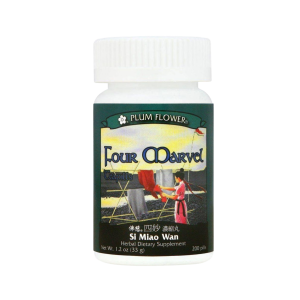 Plum Flower – Four Marvel (Si Miao Wan)
Plum Flower – Four Marvel (Si Miao Wan)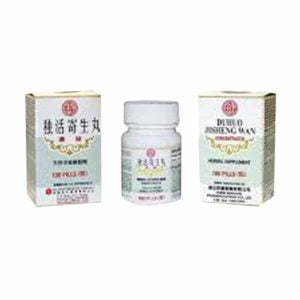 Duhuo Jisheng Wan – Solitary Hermit – Min Kang Brand
Duhuo Jisheng Wan – Solitary Hermit – Min Kang Brand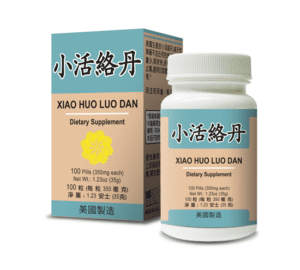 Xiao Huo Luo Dan (Healthy Joint Combo) – by Lao Wei
Xiao Huo Luo Dan (Healthy Joint Combo) – by Lao Wei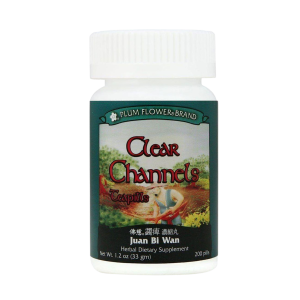 Plum Flower – Clear Channels (Juan Bi Wan)
Plum Flower – Clear Channels (Juan Bi Wan)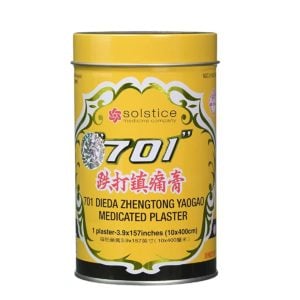 701 Dieda Zhengtong Yaogao – Pain Patch (Medicated Plaster)
701 Dieda Zhengtong Yaogao – Pain Patch (Medicated Plaster)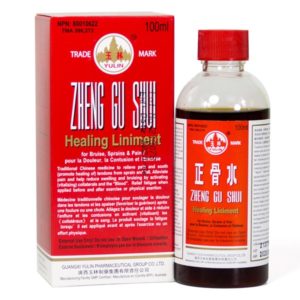 Zheng Gu Shui – Yulin Brand
Zheng Gu Shui – Yulin Brand